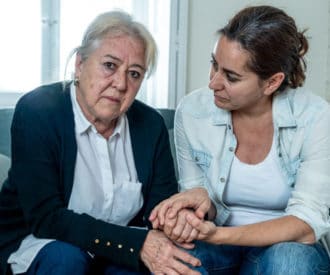A transient ischemic attack (TIA), often called a “mini-stroke,” is your body's urgent warning signal, and ignoring it could have devastating consequences. While TIAs typically cause temporary symptoms (like slurred speech or weakness), 1 in 3 people who experience one will later suffer a full stroke, and many develop vascular dementia within five years.
The good news? Prompt action can dramatically reduce these risks. In this article, we explain how to recognize TIA symptoms, why immediate medical attention is crucial, and proven strategies to protect your brain health. When it comes to TIAs, every minute matters in preventing long-term damage.

A TIA is a Mini-Stroke
If your loved one suddenly feels odd or acts strangely, even for a few minutes, it could be a sign that they’ve just had a mini-stroke.
When stroke-like symptoms appear for only a short time, it’s called a transient ischemic attack (TIA) or a mini stroke.
Symptoms could even come and go so quickly that seniors might not realize they’ve had a stroke.
We explain what happens during a TIA, symptoms and causes, and two reasons why these mini strokes are severe warnings for seniors – major stroke and vascular dementia.
TIA Stroke Symptoms and Causes
During a mini-stroke, the blood supply to the brain is briefly blocked. It’s a stroke that only lasts for a few minutes.
Symptoms of a TIA are similar to typical stroke symptoms, but don’t last as long. Most symptoms disappear within an hour, but could last for up to 24 hours.
You won’t be able to tell if these symptoms are from a TIA or a major stroke, so if your older adult has these symptoms, immediately call 911 or go to the emergency room.
Symptoms happen suddenly and include:
- Numbness or weakness, especially on one side of the body
- Confusion, trouble speaking, difficulty understanding speech
- Trouble seeing in one or both eyes
- Difficulty walking
- Dizziness
- Problems with balance or coordination
- An abnormal sense of taste or smell
A TIA is usually caused by a temporary reduction in blood flow at a narrow part of a major artery that carries blood to the brain, such as the carotid artery.
It could also be caused by a blood clot that travels to the brain and blocks a blood vessel there.
A third common cause is the narrowing of smaller blood vessels in the brain. That blocks blood flow for a short period, often caused by plaque buildup.

A TIA Can Be a Warning of Two Serious Health Conditions
1. It’s a sign of a (potential) major stroke in the future
Mini strokes usually don’t cause permanent brain damage, but they’re a serious warning sign that a major stroke will happen in the future.
Nearly 20% of people who have a suspected TIA will have a stroke within 90 days.
2. They cause vascular dementia
Vascular dementia is the second most common form of dementia and is caused by reduced blood flow to the brain, usually from a stroke or a series of strokes.
This type of dementia usually affects people aged 60 to 75 and is more common in men than women.
Even though TIAs can be unnoticeably small, the damage to the brain adds up over time.
When the blood flow to the brain is blocked, brain cells don’t get oxygen and nutrients. That causes damage to areas of the brain associated with learning, memory, and language.
This leads to memory loss, confusion, and other signs of dementia.
What to do after a TIA
If you suspect that your older adult has had a mini-stroke, take them to a hospital immediately and describe all the symptoms they experienced.
To reduce the risk of a major stroke, doctors may recommend medication to prevent blood clots from forming or to treat high blood pressure, high cholesterol, or heart disease. Depending on the situation, surgery could also be recommended.
In the long term, help your older adult reduce their risk of stroke and vascular dementia by improving their lifestyle.
A healthy lifestyle means not smoking, drinking in moderation, eating a balanced diet, and exercising regularly.
It is also important to manage other health conditions, such as exceptionally high blood pressure and high cholesterol.
Recommended for you:
- Recognize Signs of Stroke and Act F.A.S.T.
- 10 Ways to Improve Health in Seniors Living with High Blood Pressure
- What Is Vascular Dementia? Everything You Need to Know
About the Author

Connie Chow
Connie was a hands-on caregiver for her grandmother for 20 years. (Grandma made it to 101 years old!) She knows how challenging, overwhelming, and all-consuming caring for an older adult can be. She also knows how important support is — especially in the form of practical solutions, valuable resources, and self-care tips.





I am hoping that because I have very low tryglycerides and high good cholesterol, i am not likely to have any plaque.My overal cholesterol level is 210, I take no meds, and I am 87.
Your doctor knows you and your overall health so they’re the best person to determine your stroke risk.
Thank you for this info.
I think I experienced this last night. Can it cause stomach pain as well. The stomach pain could be a different problem. The client was showing all those symptoms . As well as stomach pains which I thought could be constipation. Thank you for the information you send our.
Kind regards
Felicia
We’re not medical professionals, so we can’t give advice about potential symptoms in a specific case. The best thing to do is for the client to tell their doctor about these symptoms and to have them do a thorough exam to determine the cause.
When I had taken my mom to a neurologist to assess her Alzheimer’s symptoms, he looks at the CAT scan that was run at the hospital, and he told me that she had had a mini stroke years before. This was news to me, (and to her, since she was partially “with-it” then), and hadn’t known that she had a stroke. She had none of the classic stroke symptoms. Later, I learned that sometimes, a stroke is misdiagnosed as vertigo, and indeed, she had 2 episodes of “vertigo.” Just something to be aware of.